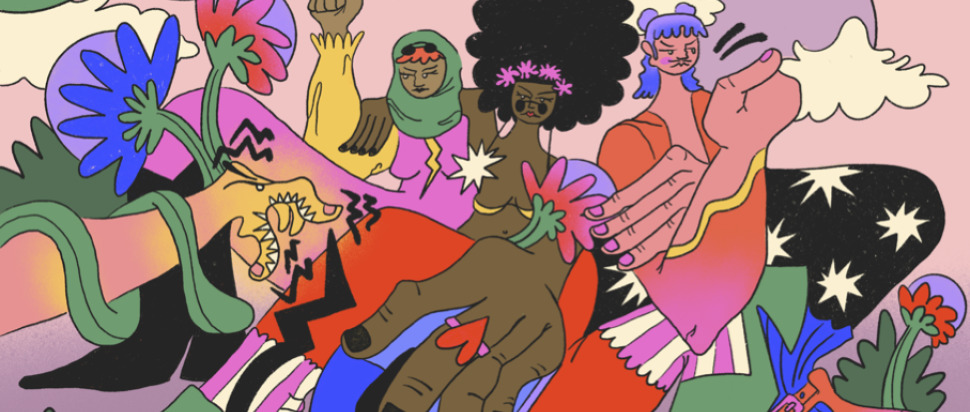Making Music Safer: Friendly Festivals in Scotland
With an aim to make Scotland's music festivals safer for all, we chat with POWA, Fanny Riot and Popgirlz about the launch of Friendly Festivals in Scotland
A 2018 YouGov poll found that 43% of female music festival goers under 40 had experienced unwanted sexual behaviour, with only 2% of incidents being reported to the police. The statistics were shocking, especially considering the Association of Independent Festivals had launched its charter of best practice, aimed at tackling sexual violence at festivals, just one year prior.
Four years on, perhaps due to little evidence of change, AIF has relaunched its charter, with 103 UK music festivals signing up. In Scotland, however, it has taken the joint effort of three activist groups to work towards inciting real change. POWA (Protection of Women in the Arts), Fanny Riot and Popgirlz have collaborated to create Friendly Festivals in Scotland (FFS), a dataset detailing which Scottish music festivals have clear policy published on their website about the prevention of sexual harassment and assault.
Before publishing the dataset, FFS contacted each festival, giving them the opportunity to commit to publishing a clear sexual harassment policy on their website. Shockingly, only one festival – HebCelt – had a visible policy before FFS was launched. The dataset offers a new way for ticket buyers, performers and staff to see what festivals are committed to safeguarding against sexual harassment.
Edinburgh-based musician and activist Lou Mclean tells us why having access to this information is so important: “Almost every female musician, staff member and attendee I know has experienced some form of harassment or assault at a festival. Backed by the YouGov research, and supported by other organisations, we have a chance to make Scotland's festivals safer. Although the literature focuses on cis women, I know genderqueer people and men who have also experienced this. It's important for all of us to make a stand and say this is not acceptable. It never was, we were just expected to put up with it."
FFS is based on Fanny Riot’s FLAPS project which supports Scottish Music Festivals to make their events safer by being “present at festivals with a safer space tent, engaging with the public and providing on-site first responders to any sexual misconduct issues,” says Marie Williamson of Fanny Riot. “FLAPS has one rhetoric – consent and respect – and we want festivals to ensure they are being visible and proactive in this too. FLAPS has been met with resistance; some say their festival doesn’t need a safer space as they are already doing enough. Unfortunately, this isn’t the case when looking at the statistics and listening to personal stories. There are those, however, who are fully on board, like Kelburn Garden Party who we are currently working with.”
Popgirlz were brought into FFS due to their 2020 Scotify campaign, where diversity issues were highlighted within Spotify's 'Scotify' playlist, and their lecture series which breaks down Vick Bain's Counting the Music Industry research and discusses inequalities within playlisting. Popgirlz founder Rachel Alice Johnson says: "FFS is a crucial campaign that aims to ensure the safety and health of attendees and workers at Scottish music festivals. Festivals should be fun and sociable, where music can be enjoyed safely.”
The FFS dataset will be updated monthly and has already received positive responses from TRNSMT, Hidden Door and Celtic Connections. As POWA states: “FFS wants to stop predatory behaviour at festivals and having a sexual harassment policy clearly displayed will hopefully prevent someone being assaulted this summer. It's that black and white. Prevention-based approaches like policies and education programmes are the world standard for tackling gender-based violence."
Evidently, good intentions in the form of signposting to support services is not enough, and a sexual harassment policy is worthless if it’s not visible to ticket buyers, staff and performers. Music festivals must prove they can provide a safe and enjoyable experience for all by providing clear policy, investing in safeguarding training, and ultimately taking responsibility for what happens at their event. The safe, supportive and inclusive music industry we want is attainable, but only if those at the top are willing to make changes that benefit everyone.
Four more organisations tackling sexual assault and harassment in the music industry
Girls Against
Girls Against is a non-profit that stands up against sexual assault and misogyny in the live music scene, and acts as a support network for victims. girlsagainst.co.uk
Good Night Out Campaign
The Good Night Out Campaign helps nightlife spaces and organisations better understand, respond to and prevent sexual harassment and assault, through specialist training, policy support and an accreditation programme. goodnightoutcampaign.org
Gig Safe Glasgow
Gig Safe Glasgow is a non-profit that hosts help desks within venues to tackle issues such as harassment and discrimination, as well as to provide a general sense of security to whoever is in need. gigsafeglasgow.co.uk
Association of Indpendent Festivals
The Association of Independent Festivals is the UK's leading non-profit festival trade association and creator of a charter of best practice aimed at tackling sexual violence at festivals. aiforg.com
If you run a festival and want to talk with FFS, email: info@friendlyfests.com
